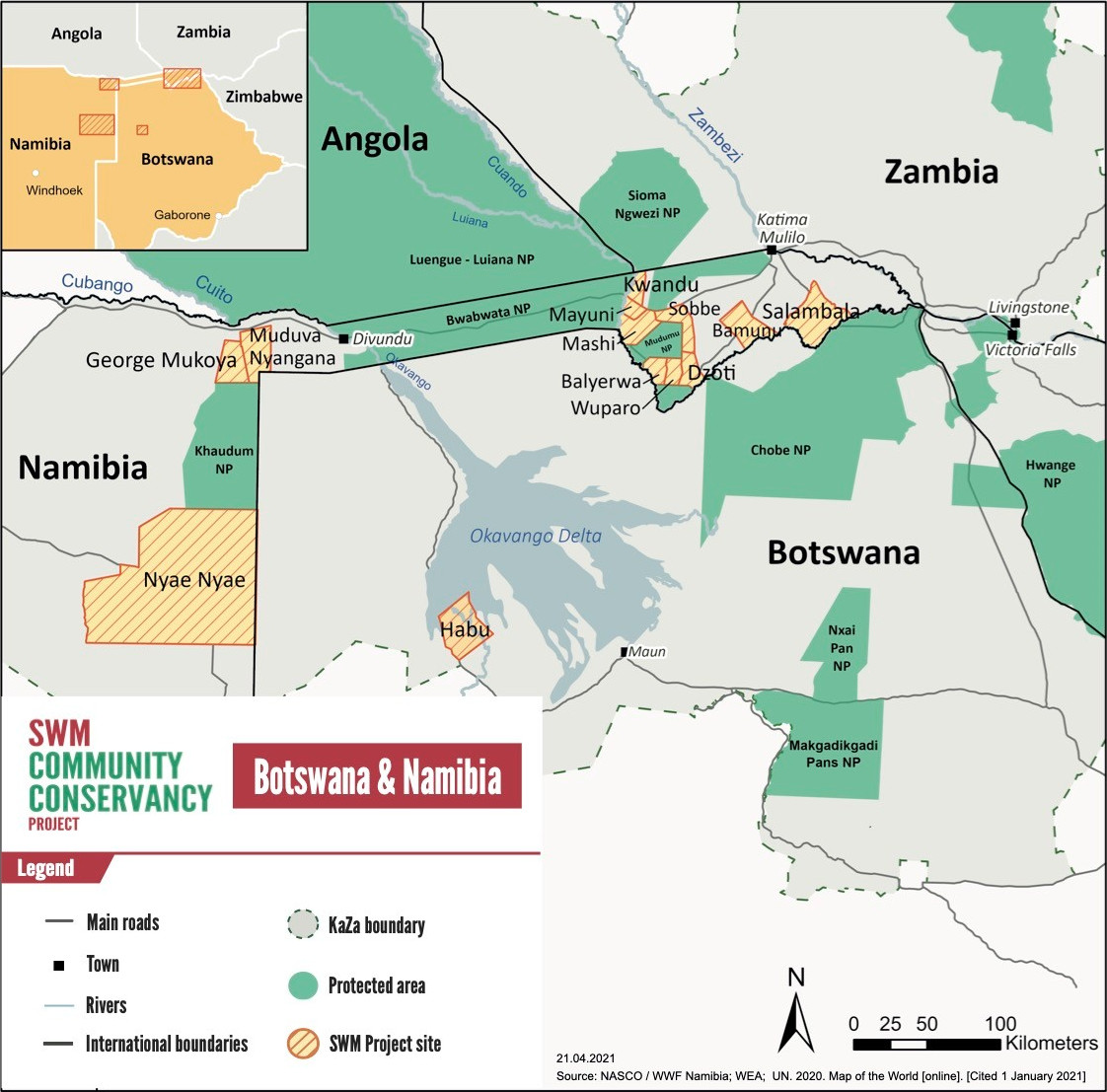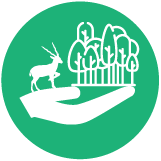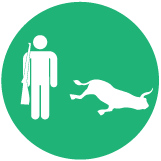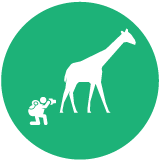Legal hub/Botswana
LEGAL HUB/BOTSWANA

BACKGROUND
Country legal hubs are a user-friendly point of access to a comprehensive set of data and analysis on the statutory legal frameworks relating to sustainable wildlife management. This includes environmental protection, tenure rights, land use planning, the consumption (hunting and fishing) and non-consumption (ecotourism) use of wildlife, as well as animal production, animal health, and food safety and security.
Each legal hub provides:
- historical and political background on the country;
- access to relevant national normative texts by sector;
- legal assessment of sectoral legislation;
- overview of the domestication of international instruments;
- description of relevant national institutions and their roles.
NATIONAL PARTNER

LEGAL AND POLITICAL CONTEXT

Political system: Republic; Presidential regime; National Assembly and the Ntlo Ya Dikgosi (House of Chiefs).
Administrative and territorial organization: Unitary state with devolution and decentralization of government powers.
Legal system: General Law (Common Law -Roman Dutch Law and Statutory Law) and Customary Law.
International Conventions: Dualist system
Botswana, officially Republic of Botswana, formerly a British protectorate called Bechuanaland (1855 -1966). It attained self-government in 1965, becoming the independent Republic of Botswana on September 30, 1966.
Botswana is a constitutional democracy, with three arms of government: the Legislature, Judiciary, and Executive. The Judiciary is an independent arm of government, established under the Constitution of the Republic. It consists of the Court of Appeal, which is the highest and final court in the country; the High Court, a superior court with unlimited jurisdiction over criminal and civil cases; and the Magistrates’ Courts, which operate under the Magistrates’ Courts Act [Chapter 04:04]. Additionally, there are Customary Courts (dikgotla) that handle tribal and minor criminal and civil cases. Appeals from these courts may be made to the Customary Court of Appeal and, if necessary, to the High Court.
The President, who presides over Cabinet, heads the Executive arm of government. The Vice President is nominated by the President and approved by Members of Parliament.
Administratively, Botswana is divided into 15 administrative districts, consisting of 9 rural districts and 6 urban districts. These districts are administered by District Councils, City and Town Councils, and sub-districts in rural areas. City and Town Councils have non-executive mayors, while District Councils have council chairpersons. Administratively, a Town/City Council is led by a Town/City Clerk, and a District Council is led by a Council Secretary. The District Administration, representing Central Government, is headed by a District Commissioner who reports to the Office of the President.
Parliament, the legislature, is composed of the National Assembly and the Ntlo Ya Dikgosi (House of Chiefs). However, the National Assembly holds the authority to enact laws for the nation, making Botswana operate under a unicameral system. The Ntlo Ya Dikgosi serves as an advisory body, providing advice on constitutional, customary law, and land issues to the National Assembly. Bills relating to tribal affairs, customary law, and the administration of customary courts must pass through the Ntlo Ya Dikgosi before being deliberated in the National Assembly. Any revision or amendment to the Constitution requires consultation with the Ntlo Ya Dikgosi.
Botswana follows a dual legal system, with Common Law and customary law coexisting. Customary law is administered in the customary courts, defined as the customary law of a particular tribe or tribal community that is not incompatible with any written law or contrary to morality, humanity, or natural justice. Botswana's Common Law is Roman Dutch Law, received through Proclamations that were made dring the time when Botswana was the Bechuanaland Protectorate.
In terms of international conventions, Botswana operates as a dualist state. This means that international treaties do not automatically become legally binding and must be incorporated into domestic law through an Act of Parliament. Therefore, ratified treaties do not immediately create enforceable rights and obligations in the courts. Customary international law applies in Botswana unless inconsistent with domestic legislation.
LEGAL FRAMEWORK
This section provides access to a list of statutory instruments specific to each sector that can be consulted and downloaded.
DIAGNOSTIC OF STATUTORY LAW
Detailed legal diagnostics are available on national statutory instruments regulating the following topics
DOMESTICATION OF RATIFIED INTERNATIONAL INSTRUMENTS
INSTITUTIONAL SET‐UP
Institutions |
Roles |
|---|---|
|
Agricultural Resources Board
|
|
|
Botswana Meat Industry Regulatory Authority
|
|
|
Botswana Medicines Regulatory Authority (BOMRA)
|
|
|
Botswana Tourism Organisation
|
|
|
Botswana United Revenues Services (BURS)
|
|
|
Botswana University of Agriculture and Natural Resources
|
|
|
Botswana Vaccine Institute
|
|
|
Botswana Wildlife Training Institute
|
|
|
Department of Animal Production
|
|
|
Department of Aquaculture and Apiculture
|
|
|
Department of Environmental Protection
|
|
|
Department of Forestry and Range Resources
|
|
|
Department of Health Services
|
|
|
Department of National Museum and Monuments
|
|
|
Department of Town and Country Planning
|
|
|
Department of Wildlife and National Parks
|
|
|
Department of Veterinary Services (DVS)
|
|
|
District Councils
|
|
|
Tourism Industry Licensing Committee
|
|
|
Board of Botswana Tourism
|
|
|
Land Board
|
|
|
National Food Control Board
|
|
|
National Health Council
|
|
|
Office of the Ombudsman
|
|
|
Veterinary Surgeons Council
|
|







